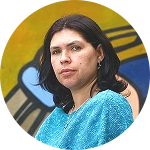
At the start of the pandemic in the region, the Trade Union Confederation of the Americas (TUCA) issued a position paper and a set of guidelines that emerged from dozens of meetings held with affiliates to find out what the situation was in each country. This document listed a series of measures to be taken in response to the pandemic and its consequences.
These measures form part of the programme of the Development Platform of the Americas (or PLADA, an ambitious regional platform launched by TUCA in 2014 to consolidate guidelines and principles). In other words, they are the result of a comprehensive regional overview that focuses on the need to make structural changes.
The pandemic brings with it an opportunity. It makes visible both the need for structural change and the existence of concrete proposals to that end. PLADA is a response to the crisis and a commitment to a recovery based on sustainable development, social justice, decent work and the defence of democracy. PLADA “places work (in all its dimensions) at the centre of an alternative development model to neoliberalism”.
The central role of work
In the Americas, estimates of the impact that Covid-19 will have are enormous given the vulnerabilities prior to the start of the pandemic. The United Nations Economic Commission for Latin America and the Caribbean estimates that by the end of 2020 we will have a regional unemployment rate of around 13.5 per cent, which represents 44.1 million people out of work.
As stated by TUCA in its latest analyses (the September Special Report and the October Bulletin) on the impact of the pandemic on labour rights and the major trends in the region in the world of work, published in the framework of the Labour Observatory of the Americas, “the measures adopted by the governments have not put the dignity of the lives of workers at the centre”. In these analyses, TUCA focuses on the regressive labour reforms that are being driven by events in the guise of measures supposedly aimed at dealing with the health emergency.
Thus the health emergency has allowed multinational companies to lay off workers en masse. It has also enabled a reduction in wages and working hours, the use of mandatory vacations, including without pay, as well as the cancellation and or renegotiation of contracts.
In some countries such as Brazil and Chile, specific legislation has been approved that has been used to dismantle the compulsory nature of collective bargaining and make contracts more flexible.
Faced with this scenario, collective bargaining, freedom of association and social dialogue must be considered democratic minimums for societies that should seek to be increasingly democratic.
PLADA not only sets out our plans for the defence of fundamental labour rights but also the need to promote the construction of national plans, allowing for public debate. In other words, it must be a participatory process with true social dialogue. Before the pandemic, unions pointed to the need to address, as a priority, major technological change and the impact this has on work. This change must be examined through dialogue, with the presence of organised workers, in a democratic way. A changing world of work also requires changes in trade unions.
PLADA addresses the challenge facing unions of organising workers in all their diversity and within a framework that provides the greatest possible unity. Trade unions are staking their future on this process, that we have come to call ‘self-reform’. Recently and despite the difficult circumstances that we currently face, TUCA has been working on preparations for a Continental Conference on the Transformation of the Unions.
The idea that unions are active agents of development and that we will build our own future is at the root of our commitment to union change. We need strong but diverse structures that can attract the working masses by highlighting the essence of work and its importance in the current context.
In short, through the principles and pillars proposed in PLADA, TUCA is committed to the construction of a new social contract centred on work and the working class. A true commitment to Sustainable Development Goal (SDG) 8 - on decent work - and the effective implementation of the 2030 Agenda requires innovative and structural change. We cannot expect changes of magnitude if we continue to allow the non-respect of workers’ rights, if we continue to allow democracy to be undermined and our leaders continue to be assassinated, if we do not address the impact of climate change with justice and with consideration for the issues of class, if we do not establish real social dialogue whereby workers and their organisations can express their opinions and raise their demands. The 2030 Agenda takes a comprehensive view of the SDGs, and PLADA has specific comprehensive proposals in line with this agenda.
Policies for a just recovery and for the working class
PLADA is an innovative set of policy guidelines, the four dimensions of which include a series of proposals that respond to our current challenges and problems.
Our programme proposals refer to the need for profound political reforms that prioritise the power of the people and address the interference of economic powers. The recognition of trade unions as instruments of democracy and the exercise of human rights is at the root of PLADA’s political agenda.
Economic recovery must go hand in hand with due attention to the working class. The historical demands for the fair distribution of earnings, income, wealth and the surplus produced by large companies are not only still relevant but are truly urgent today.
Not everyone is suffering from the pandemic. It is obvious that some multinationals have done well out of it, with their workers bearing the cost. States must control the multinationals and review the idea of development based heavily on foreign investment.
In the Americas, some in-depth debates are taking place that are calling our power structures into question. Debates about production, land distribution, access to food and productive land are essential and determine the scope of true sustainable development with social justice. This requires a bigger and better role for the state and public policies. The pandemic has taught us that public policies are necessary and to that end strong, democratic state structures are required that protect the public interest.
Finally, there can be no equitable recovery if we continue to ignore our relationship with nature and gender equality. The policies that emerge from the crisis cannot reverse the policies to address climate change, or the need to implement just transition plans with the real participation of the working class. PLADA argues that work plays a central role in the relationship between society and nature and for this reason, unions have much to say about how we address the environmental crisis. The importance of achieving just transition policies goes hand in hand with the debate on the production and consumption model because, as stated in PLADA “there will be no just transition if economic decisions continue to be dominated by global finance”.
Real change is achieved through the recognition of equality between people. Working for recovery with social justice is also a question of gender justice. The sustainability of life in a crisis like the current one is key. PLADA proposes the promotion of counter-patriarchal development models that address gender inequality and implement active policies to eradicate gender-based violence, recognise reproductive work, equal pay and see care as the responsibility of the whole of society.








